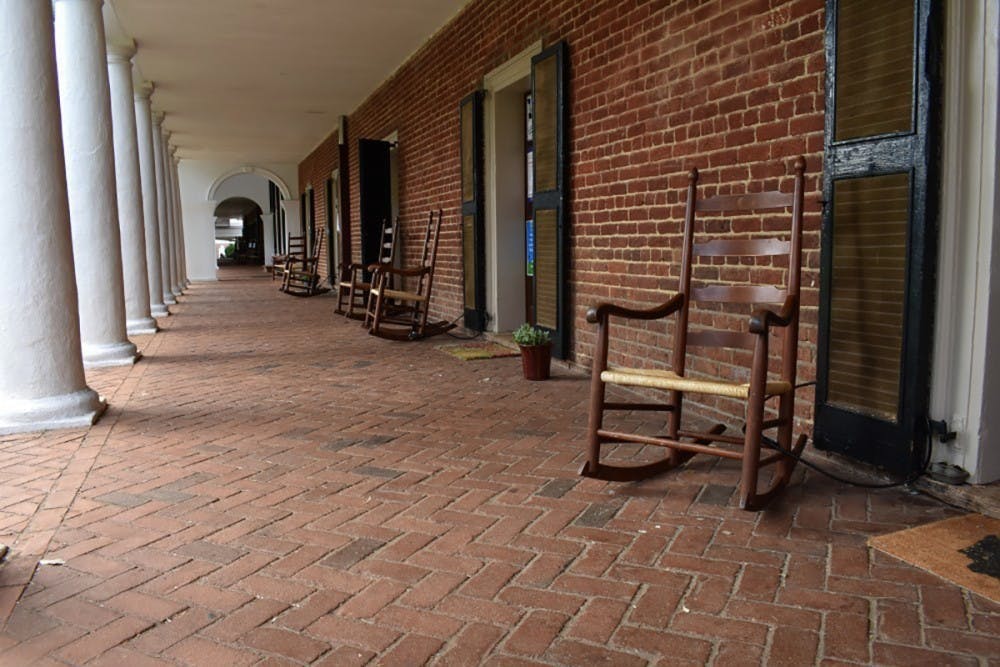Lea en español
The University has implemented additional restrictions on the signage Lawn room residents can put on their doors following controversy over signs posted last semester. According to the addendum to the Terms and Conditions for Lawn and Range Residents, Housing and Residence Life will affix two message boards to each Lawn room door, to which residents are permitted to attach messages or paper materials.
“Any materials placed on the message boards must fit within the four corners of each message board and cannot extend beyond the outer edges of any such board,” the addendum reads. “Paper materials or other items may not be placed on Lawn or Range room doors, the doorway, shutters, or the brick areas outside the room except on the message boards as described above.”
Previously, Lawn and Range residents were permitted to have one 1.5 ft by 2 ft pin board outside of their room for displaying paper materials, according to Coy.
The revision comes after large signs posted on Lawn room doors last fall containing profanity such as “F—k UVA” and criticizing the University’s history of enslavement and inaccessibility prompted calls for removal by some alumni and community members.
University President Jim Ryan addressed the controversy in October via a written statement in which he called the signs “deeply disappointing.” University Counsel Tim Heaphy confirmed that the signs were protected by the First Amendment, though Ryan said that the University would consider implementing additional restrictions on the signage permitted outside Lawn rooms before the start of the next academic year.
“Last semester, President Ryan pledged to review University policy on the display of signs on Lawn room doors and find a better balance between protecting the First Amendment rights of the student residents and preserving the unique and public character of the Lawn for members of our community and visitors from all over the world,” University spokesperson Brian Coy said. “[The addendum] clarifies and refines existing University policy on the size of signs that can be displayed on Lawn room doors.”
In a collective statement to The Cavalier Daily, the Lawn residents who posted “F—k UVA” signs on their doors this fall said that it is “particularly malicious” that the University will celebrate record-breaking numbers of more diverse students who are Lawn residents next year while “simultaneously enforcing unprecedented policies that limit free speech.”
The residents also noted the disproportionately adverse effect the policy’s revision will have on students of color living on the Lawn, noting that it will result in “increased surveillance” which will in turn “inherently harm and endanger the most marginalized and vulnerable students in this space.”
“Though we initially made it a goal of ours to center only the content of our signs as opposed to conversations surrounding free speech, this policy is undeniably biased on those very grounds,” the statement said. “This policy displays the extent to which the University is selective about who can exercise free speech and the content of that expression. Evidently, BIPOC students and allies cannot be critical of the University while simultaneously living on the Lawn.”
Residents noted that it is not clear “how these message boards will be utilized nor how these purposely vague guidelines will be enforced” and disputed the notion that their signs were not mindful of the University’s unique history and position as a World Heritage site.
“Our signs, more than any other effort of this University, were honest and realistic about the violence of this institution and this space,” the statement said. “We have and will continue to be more mindful about this space – in its history, meaning, and position – than the University of Virginia has ever been. ”
Third-year College student Ryan Alcorn, third-year council president and future Lawn resident, said that he thinks the decision reflects “an ugly history” of the University silencing unconventional student protests on the Lawn.
“This decision follows calls for a higher standard of civility for public displays on the Lawn,” Alcorn said. “I would encourage those making such demands to recall that students regularly run around naked and drink to excess on this UNESCO heritage site, and consider that the Lawn is not a lifeless museum but a place where young people come to enjoy and express themselves.”
Student Council passed a resolution in October denouncing the potential blanket ban on Lawn room signs and called on the University to stop any consideration of additional regulations that would restrict the rights of Lawn residents to express themselves peacefully.
“President Ryan has made himself clear — ‘As long as I am president, the University
of Virginia will not walk away from Thomas Jefferson,’” the resolution reads. “If this is the hill our president chooses to die on, so be it. But he would do well to remember the founder’s words — ‘I hold it that a little rebellion now and then is a good thing, and as necessary in the political world as storms in the physical.’”







